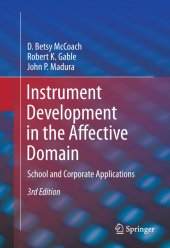 Neuerscheinungen 2015Stand: 2020-02-01 |
Schnellsuche
ISBN/Stichwort/Autor
|
Herderstraße 10
10625 Berlin
Tel.: 030 315 714 16
Fax 030 315 714 14
info@buchspektrum.de |

Robert K. Gable, John P. Madura, D. Betsy McCoach
(Beteiligte)
Instrument Development in the Affective Domain
School and Corporate Applications
3. Aufl. 2015. xvi, 307 S. 35 SW-Abb. 235 mm
Verlag/Jahr: SPRINGER, BERLIN; SPRINGER NEW YORK; SPRINGER 2015
ISBN: 1-493-90061-7 (1493900617)
Neue ISBN: 978-1-493-90061-9 (9781493900619)
Preis und Lieferzeit: Bitte klicken
This book examines the art and the science of instrument development and evaluation, covering both its conceptual and technical aspects. It offers a systematic analysis of all phases of the design process, with examples from academic and business settings.
Whether the concept being studied is job satisfaction, self-efficacy, or student motivation, values and attitudes--affective characteristics--provide crucial keys to how individuals think, learn, and behave. And not surprisingly, as measurement of these traits gains importance in the academic and corporate worlds, there is an ongoing need for valid, scientifically sound instruments.
For those involved in creating self-report measures, the completely updated Third Edition of Instrument Development in the Affective Domain balances the art and science of instrument development and evaluation, covering both its conceptual and technical aspects. The book is written to be accessible with the minimum of statistical background, and reviews affective constructs from a measurement standpoint. Examples are drawn from academic and business settings for insights into design as well as the relevance of affective measures to educational and corporate testing. This systematic analysis of all phases of the design process includes:
Measurement, scaling, and item-writing techniques.
Validity issues: collecting evidence based on instrument content.
Testing the internal structure of an instrument: exploratory and confirmatory factor analyses.
Measurement invariance and other advanced methods for examining internal structure.
Strengthening the validity argument: relationships to external variables.
Addressing reliability issues.
As a graduate course between covers and an invaluable professional tool, the Third Edition of Instrument Design in the Affective Domain will be hailed as a bedrock resource by researchers and students in psychology, education, and the social sciences, as well as human resource professionals in the corporate world.
Affective characteristics in school and corporate environments: Their conceptual differences.- Defining measuring and scaling affective constructs.- Evidence based on test content.- Evidence based on the internal structure of the instrument: Factor analysis.- Additional evidence based on the internal structure of the instrument.- Evidence based on relations to other variables: Bolstering the empirical validity argument for constructs.- The reliability of scores from affective instruments.- Review of the steps for designing an instrument.


